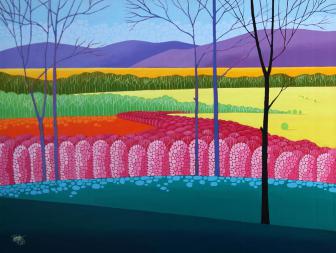Artikel
Welcome to Colombian poetry - October 2004

18 januari 2006
Currently, this loss of boundaries and frontiers is more evident than ever. Baudelaire and Rimbaud, Mallarmé, European romanticism, German expressionism, dadaism, surrealism, the Latin American avant-garde, etc., are no longer the heritage of any one country: they belong to the history of poetry, of all poetry. Poets, of any nationality, no longer nurture themselves exclusively in their own social and historical environment; they drink from a fountain whose waters spring forth everywhere. What we might call a national tradition is no more than a theoretical means of facilitating the critical exposition of a particular geographical framework. The real motherland of a poet is his or her native language.
Although a national or local subject matter has not been absent from Colombian poetry, the subject of violence (which seems to be a tragic part of our uncertain identity) has not characterised our poetry, as it did our fiction in the 1950s; so we cannot affirm that our particular ‘subject matter’ is markedly different from that of other poetry written in the Spanish language.
Apart from the specific importance it may represent now in the general panorama of poetry written in Spanish, Colombian poetry includes voices that show not only the quality of their production but wide future perspectives. Witness the work of León de Greiff, Luis Vidales, Aurelio Arturo, Jorge Gaitán Durán, Eduardo Cote Lamus, Fernando Charry Lara, Alvaro Mutis, and, from the newer generations, Juan Manuel Roca, Giovanni Quessep, Mario Rivero, Raúl Henao, Jaime Jaramillo Escobar and María Mercedes Carranza, to mention only some of the most outstanding names. Translated by Nicolás Suescún
Modern Colombian poetry, although arguably one of the most conservative in the Spanish language, the least responsive to the spirit of the avant-garde at the beginning of the twentieth century and the most reluctant to explore formal experimentation, is no longer an exception. With the arrival of the generation of Los nuevos (the new ones), one can say that Colombian poetry joined the current of a universal movement, a fact consolidated three decades later by the creation of the review Mito.
Modern poetry, which we can consider as beginning in the nineteenth century, is a network that extends beyond the frame of so-called national literatures. In Latin America, the first decade of the twentieth century began with the ‘explosion’ of the avant-garde, which drew not only on the best of the European tradition but also on the spirit of poetic production at that time. Since then, national idiosyncracies have been breaking down more and more, within the huge network of communicating vessels that constitutes modern poetry.Currently, this loss of boundaries and frontiers is more evident than ever. Baudelaire and Rimbaud, Mallarmé, European romanticism, German expressionism, dadaism, surrealism, the Latin American avant-garde, etc., are no longer the heritage of any one country: they belong to the history of poetry, of all poetry. Poets, of any nationality, no longer nurture themselves exclusively in their own social and historical environment; they drink from a fountain whose waters spring forth everywhere. What we might call a national tradition is no more than a theoretical means of facilitating the critical exposition of a particular geographical framework. The real motherland of a poet is his or her native language.
Although a national or local subject matter has not been absent from Colombian poetry, the subject of violence (which seems to be a tragic part of our uncertain identity) has not characterised our poetry, as it did our fiction in the 1950s; so we cannot affirm that our particular ‘subject matter’ is markedly different from that of other poetry written in the Spanish language.
Apart from the specific importance it may represent now in the general panorama of poetry written in Spanish, Colombian poetry includes voices that show not only the quality of their production but wide future perspectives. Witness the work of León de Greiff, Luis Vidales, Aurelio Arturo, Jorge Gaitán Durán, Eduardo Cote Lamus, Fernando Charry Lara, Alvaro Mutis, and, from the newer generations, Juan Manuel Roca, Giovanni Quessep, Mario Rivero, Raúl Henao, Jaime Jaramillo Escobar and María Mercedes Carranza, to mention only some of the most outstanding names. Translated by Nicolás Suescún
© Gabriel Jaime Franco
Sponsors












Partners
LantarenVenster – Verhalenhuis Belvédère

